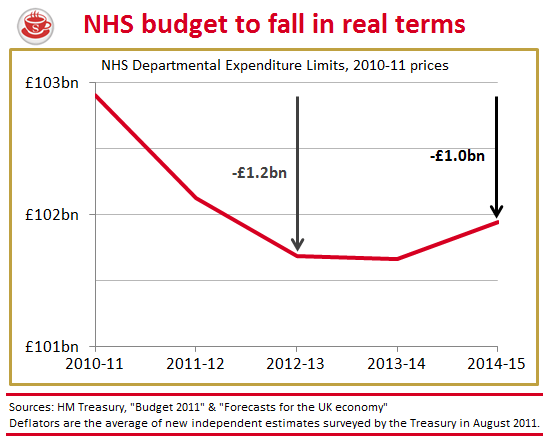Before the election, the Conservatives promised they’d “protect” the NHS, which they defined as increasing its real-terms budget year-on-year. This is a rather dangerous promise because it makes ministers hostage to inflation. Now that inflation has surged, expectations have been revised upwards, and it looks like the NHS budget will suffer a real-terms cut. In its monthly update of City consensus forecasts, the Treasury has released new figures for inflation over the next five years.Apply the latest inflation figures to health spending in the last budget and it implies a £1bn shortfall . The graph below shows the change over five years:

Back in March, the IFS said that the government was in danger of breaking that pledge. As Pete explained at the time, this was not because of a change in the government’s spending plans, but rather in the “GDP deflators”: projections of how much £1 will be worth in 2014-15 compared to now. In March, it looked like the NHS spending plans would amount to an effective freeze. Now, they will decline.
Does this matter? Not to me: I think the government was daft to define “protection” as keeping a budget up. That is Labour logic, the type that saw education standards fall over 13 Labour years while ministers focused on the “investment” and assumed that standards must rise as a result of budget increases. Labour was right to say it would cut the NHS budget. The Canadian experience of fiscal consolidation shows that the pain must be spread equally. The NHS budget increased the most over the Labour years, so it is daft to suggest that it’s the only budget where cuts cannot be made.
But, the government made its pledge and ministers will now have to take flak over cuts in health spending, cuts that are so small to be within the margin of error. They only have themselves to
blame.
UPDATE: Andrew Neil put these figures to Andrew Lansley earlier on this evening and Lansley flatly rejected them, maintaining that the coalition’s pledge to increase spending on
the NHS in real terms had not been knocked off course by higher than expected inflation. He stressed that “health spending is rising in reference to the GDP deflator”.
When presented with figures showing health spending falling in real terms, Lansley replied, “I’m sorry that is simply not true”. He complained that the figures were not taking into account “the actual amount spent in the NHS in 2010-11’. He claimed that health spending “rises by a small amount in real terms”. He promised to “gladly put up the data” to prove this point. We’re looking forward to it.







Comments